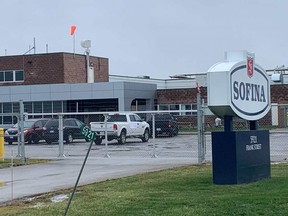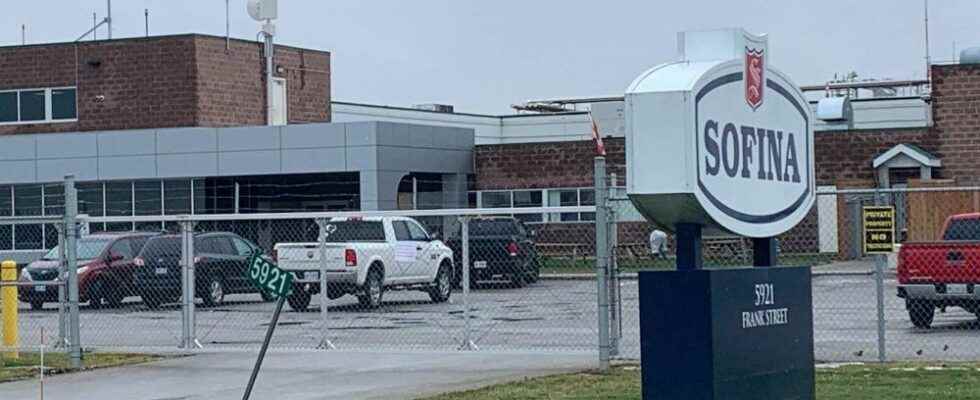The Canadian Food Inspection Agency has temporarily shut down operations at a Perth County poultry processing plant after highly pathogenic avian influenza was discovered in poultry that had recently been transported to the plant.

The bird flu epidemic that has forced farmers across Canada to cull tens of thousands of chickens and turkeys has led to the temporary shutdown of a Perth County poultry processing plant, Canadian Food Inspection Agency officials have confirmed.
The Sofina Foods Inc. plant was ordered to cease operations after the highly pathogenic avian influenza was discovered by Canadian Food Inspection Agency (CFIA) inspectors in a shipment of poultry that had recently arrived at the plant.
According to a CFIA spokesperson, the agency responded after inspectors discovered a high rate of death during a routine inspection of the poultry prior to their slaughter. The virus was confirmed on Dec. 13 following further testing of the birds.
Since the virus was discovered, control measures have been implemented at the Mitchell, Ont., plant that include movement restrictions, a halt on processing activities, and the thorough cleaning and disinfection of the plant.
“On Dec. 13, a flock of turkeys was delivered to our processing facility in Mitchell,” Sofina Foods said in an emailed statement Friday. “A small number of the turkeys tested positive for avian influenza (HPAI) H5N1. This was an isolated incident based on one delivery of birds from an independent, third-party farm. Sofina took immediate action and has been working with the Canadian Food Inspection Agency and Huron Perth public health to ensure the safety of our people, the public and our products.
“Affected product was contained on premises and never entered the public domain. The CFIA has also confirmed there is no evidence to suggest that eating cooked poultry or eggs could transmit HPAI to humans. (Public health) has confirmed that the HPAI H5N1 virus does not easily cross from birds to humans and the risk to the public is very low.”
In the statement, Sofina Foods said it plans to return to normal operations at the Mitchell plant on Dec. 19.
Since December 2021, when the bird flu made its first reported return to Ontario since a 2015 outbreak, the highly contagious H5N1 strain of the virus has been found at numerous farm operations across the country. Following a four-month lull beginning in May, another outbreak of the virus was discovered in Ontario at a farm in nearby Zorra Township in Oxford County. During that same time, the bird flu has only been detected three times at Canadian processing plants, including this latest incidence at Sofina.
Particularly deadly to domestic poultry, the avian flu has also been confirmed in outbreaks across Western Canada in September, as well as non-poultry flocks in the same region. As of Sept. 27, the federal government reported at least 2.5-million birds, including 561,000 in Ontario, had been affected.
“Avian flu is always circulating but, most years, it’s a less harmful strain than we see this year,” said Western University biology professor Beth MacDougall-Shackleton, an expert in ecoimmunology and behavioral ecology of migratory birds.
“This year it’s called highly pathogenic, meaning it’s extremely harmful. It’s not harmful to every single species of bird. Many ducks can be infected with it and not show critical symptoms for example, which actually makes it more dangerous because they can be asymptomatic and then spread it to things like chickens … and wild species of birds too.”
MacDougall-Shackleton added, “It is a very nasty disease. This strain kills, I would say, upwards of 90 per cent of infected birds. They die within days and it’s really unpleasant.”
The risk of avian flu to human health is still considered low. In the rare cases where people do catch the virus, the CFIA has said it’s most likely the result of close contact with infected, live birds or heavily contaminated environments. MacDougall-Shackleton said the real risk is to the health of domestic and wild bird populations due the ease of transmission via contaminated surfaces, the feathers and feces of infected birds, nearby waterways, and migratory bird species that can be carriers.
“If (the avian flu) is discovered, then all the birds on the farm have to be humanely euthanized (immediately),” she said. “In terms of a processing plant, that would be up to the CFIA, but I believe there would have to be deep cleaning of any surfaces and any structures that would have been in contact with the virus. … I know some poultry farms and they’ve been very, very careful and very proactive making sure nobody wears dirty footwear from outside into the chicken facilities,” she said.
The good news, she said, is that cleaning and disinfection works well to mitigate the spread of the virus.
Sofina Foods is relatively new to Perth County. The company expanded its turkey processing operations to the West Perth town of Mitchell after buying a former pork-processing plant in 2015 and spending two years and $55 million, including roughly $5 million from the province, to convert it for turkeys. A privately owned company based in Markham, Ont., Sofina describes itself on its website as a leading manufacturer of “primary and further processed protein products” for both retail and commercial customers.
gsimmons@postmedia.com
